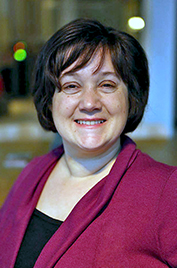On March 19, 2014 you can make a difference. If you are an international student or employee at TU Delft, you may be eligible to cast your vote in the upcoming municipal elections.
Lucie Herraiz Cunningham, a candidate of GroenLinks Delft, explains that every vote counts. “Delft candidates do not need a huge number of votes to get a seat in the council, only about 375 votes,” she says, adding, “Voting is an essential right, whether you live in your home country or abroad. If you do not vote to support your values, extreme political parties will benefit from it as their members are proactive about voting – especially in times of economic crisis.” An expat herself, Cunningham has lived in Delft for 11 years.
Another international face in the elections is Iranian expat Foroogh Daneshmand, who has lived here since 2001. A candidate with the D66 party, Daneshmand points out that a number of parties, including hers, are working to address the concerns of expats, but internationals have to participate in order to be heard. “An international is also someone who lives, works and study here. It means that they have obligations as well as rights in this society,” she says.
Interestingly, there’s a local party that traces its roots back to TU Delft. Studenten Techniek In Politiek (Students of Technology in Politics), popularly known as STIP, was established in 1993 as a result of a dispute between TU Delft and the city of Delft. Party member, Gennadij Kreukniet, a member of the current council, repatriated from South Africa in 2009 to study in Delft. “In 1994 the first seat was obtained and ever since STIP has been working towards turning Delft into the smart, innovative city that technical students expect. Providing the right conditions for companies to settle, for employees to live well and for creative ideas to grow makes the city utilize its great potential,” he says.
For those ready to go out and vote, candidates have some pointers: Check party websites, read up on political parties, their backgrounds and on the candidates. Hopefully, parties who take into consideration the internationals will also provide s of their election programmes. “Remember, the Dutch political system counts votes through a system that takes into account the electoral quota and the number of votes cast – so every vote counts,” says Catherine Bij de Vaate of GroenLinks Delft.
The City Council
The Gemeenteraad (City Council) is the supreme body of the residents of the municipality of Delft. It is made of thirty-seven councillors, who can be from various political parties and are elected into office ever four years. As representatives of the citizens, the councillors work on behalf of the locals and also ensure that the Mayor and Alderman work towards that end.
Candidates from twelve political parties are contesting the 2014 elections. They are: D66, PvdA, GroenLinks, VVD, Onafhankelijk Delft, CDA, STIP, Stadsbelangen, SP, ChristenUnie, DOP (Delftse Ouderen Partij) en Partij voor Sociale en Maatschappelijke Vernieuwing. You can access the names of all contesting candidates in the Actueel (Topical News) section on ris.delft.nl.
The outgoing council was formed by candidates from ten political parties – with five in the ruling coalition and five in opposition.
The role of citizens doesn’t end with the elections. They are encouraged to be part of the public meetings; get in touch with council or individual board members with grievances; ask for a referendum and so on.
We asked international students at TU Delft what they would look for in a councillor if they could vote. Amir Meshkat, a PhD researcher from Iran, says, “Age and political agenda. I would prefer to vote for a young candidate. Sine Celik, a PhD researcher from Turkey says, “I’d look for a candidate who places some emphasis on human concerns, rather than someone whose only focus is the economy.”
What is the municipal election?
What is the municipal election?
Every four years, citizens vote for a new City Council. The Delft City Council has 37 seats.
When are the 2014-2018 elections?
March 19. Voting booths remain open from 7:30 to 21:00 across 48 booths in Delft.
Who Can Vote?
-
Dutch citizens -
EU-citizens registered as living in Delft for over a year -
Non-EU citizens registered as living in Delft for over five years
How do I get a voting pass?
Voting passes called stempas will be delivered to your registered address by March 4 2014. Contact the Gemeente if you don’t get yours. Take your stempas and your passport or ID card with you to vote.



Comments are closed.